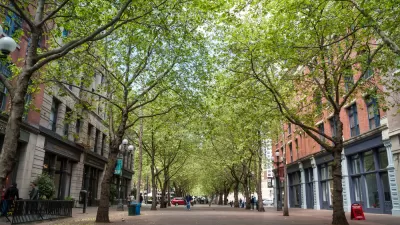ScienceDaily reports on a new study by researchers from Princeton University and the Massachusetts Institute of Technology which shows that what used to be considered a 'Storm of the Century' may soon become a 'Storm of the Decade.'
The report published in the journal Nature Climate Change predicts that due to the Earth's climate changes, "regions such as the New York City metropolitan area that currently experience a disastrous flood every century could instead become submerged every one or two decades." The study noted that increases in storm intensity were accompanied by increases in frequency, a double dose of bad news for coastal communities.
The research, which used New York City as a test case to model several storm scenarios, is said to be the first study to, "examine the future intensity of storm surges, [and] also to offer a tool for estimating an area's vulnerability," said co-author Michael Oppenheimer, the Albert G. Milbank Professor of Geosciences and International Affairs at Princeton.
"The physical damage and economic loss that result from storm surge can be devastating to individuals, businesses, infrastructure and communities. For current coastal community planning and design projects, it is essential that the effects of climate change be included in storm-surge predictions," noted Carol Friedland, an assistant professor of construction management and industrial engineering at Louisiana State University.
FULL STORY: 'Storm of the Century' May Become 'Storm of the Decade'

Planetizen Federal Action Tracker
A weekly monitor of how Trump’s orders and actions are impacting planners and planning in America.

Maui's Vacation Rental Debate Turns Ugly
Verbal attacks, misinformation campaigns and fistfights plague a high-stakes debate to convert thousands of vacation rentals into long-term housing.

Restaurant Patios Were a Pandemic Win — Why Were They so Hard to Keep?
Social distancing requirements and changes in travel patterns prompted cities to pilot new uses for street and sidewalk space. Then it got complicated.

In California Battle of Housing vs. Environment, Housing Just Won
A new state law significantly limits the power of CEQA, an environmental review law that served as a powerful tool for blocking new development.

Boulder Eliminates Parking Minimums Citywide
Officials estimate the cost of building a single underground parking space at up to $100,000.

Orange County, Florida Adopts Largest US “Sprawl Repair” Code
The ‘Orange Code’ seeks to rectify decades of sprawl-inducing, car-oriented development.
Urban Design for Planners 1: Software Tools
This six-course series explores essential urban design concepts using open source software and equips planners with the tools they need to participate fully in the urban design process.
Planning for Universal Design
Learn the tools for implementing Universal Design in planning regulations.
Heyer Gruel & Associates PA
JM Goldson LLC
Custer County Colorado
City of Camden Redevelopment Agency
City of Astoria
Transportation Research & Education Center (TREC) at Portland State University
Jefferson Parish Government
Camden Redevelopment Agency
City of Claremont





























